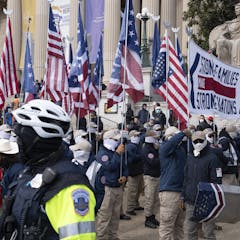
Articles on Conspiracy theories
Displaying 1 - 20 of 270 articles

A professor shows science students how humanities classes are the real stem that other disciplines sprout from. They learn that critical thinking and skepticism don’t stop when they leave the lab.

The story of the ‘royal malady’ highlights the growth of the press and how it has shaped how the British public perceives the royal family.

Rural white people have long held disproportionate power in US politics. But polls suggest their commitments to the American political system are eroding.

New research shows that even after Facebook made changes to stem the tide of dangerous pandemic misinformation, some accounts continued to thrive.

The pros and pitfalls of this type of thinking

A scholar of history of education and American politics explains what is behind his course on conspiracy theories and how students learn to debunk fake ideas.

False ideas about the extinction of the white race, spread around the late 19th and early 20th centuries, gave rise to xenophobic and anti-immigration conspiracy theories.

Russian disinformation expert Ilya Yablokov tells The Conversation Weekly podcast about the president’s shifting relationship with conspiracy theories.

When Liz Truss blames shadowy elitists for her failings as prime minister, she is leaning into a tried-and-tested formula.

Nearly a third of Americans say they believe that Donald Trump was the real winner of the last election, and the ratio is twice as high among Republican voters.

People who dive into misinformation are driven to satisfy an emotional need, according to our new research.

One of the more satisfying aspects of conspiracy theorising is, sometimes, they might just be right.

A new study has found no evidence that people’s beliefs in conspiracy theories increase over time. They can even change their minds – just not that often.

This Super Bowl sees the convergence of two emotional fandoms: Swifties and NFL fans.

Being smart won’t protect you from falling down conspiracy rabbit holes.

Conspiracy theories about urban planning are born of a national context in which public transport provision is failing

The liberal establishment can also be responsible for disseminating conspiracy theories.

It is now not uncommon to find people supporting leaders like Donald Trump while insisting the state refrains from intervening in their lives.

People who are suspicious of science often assume they are understand it well – and that others agree with them.

Study on antisemitic conspiracy theories shows they can make groups turn inwards for support and more fearful of others.
